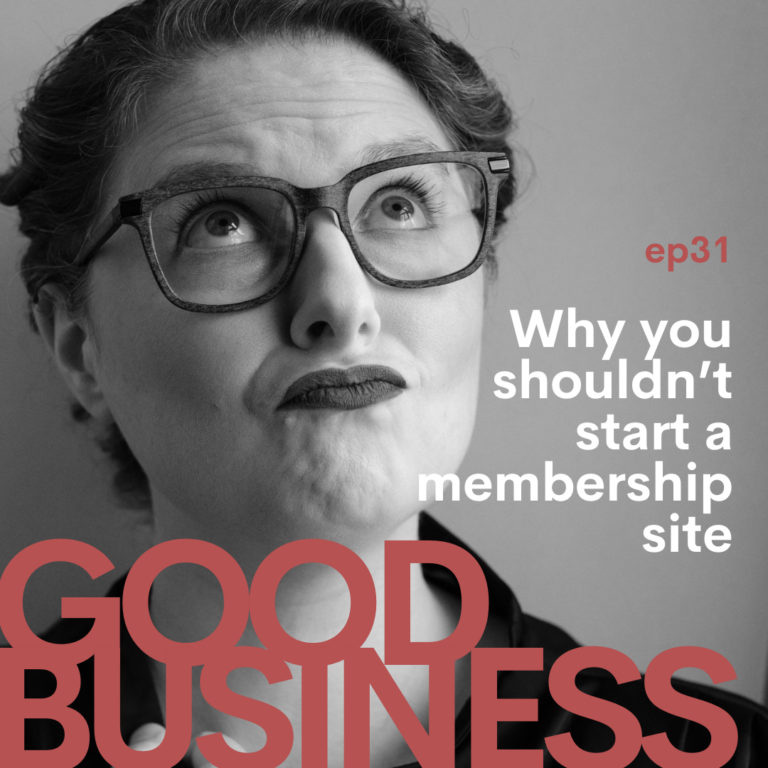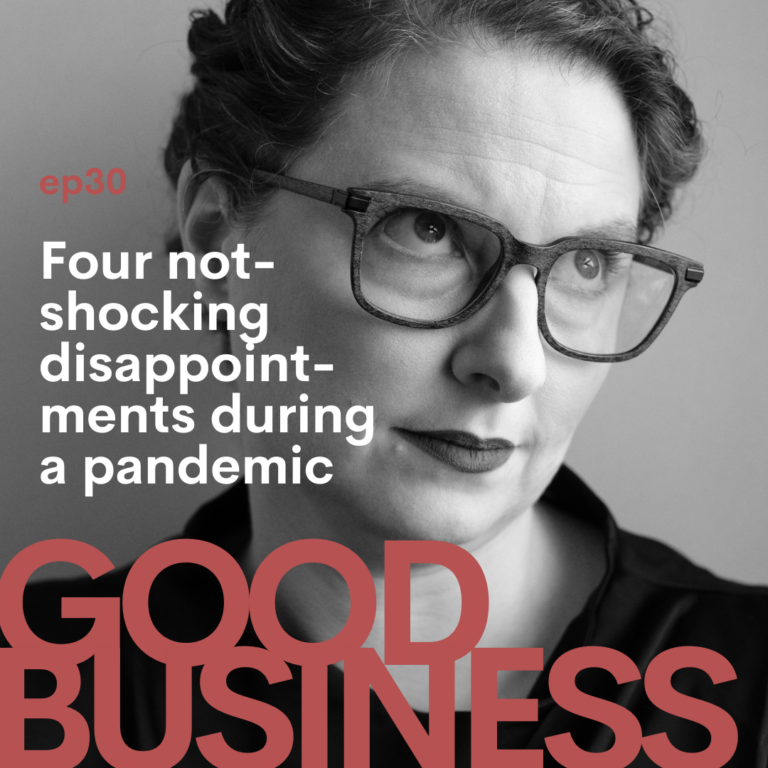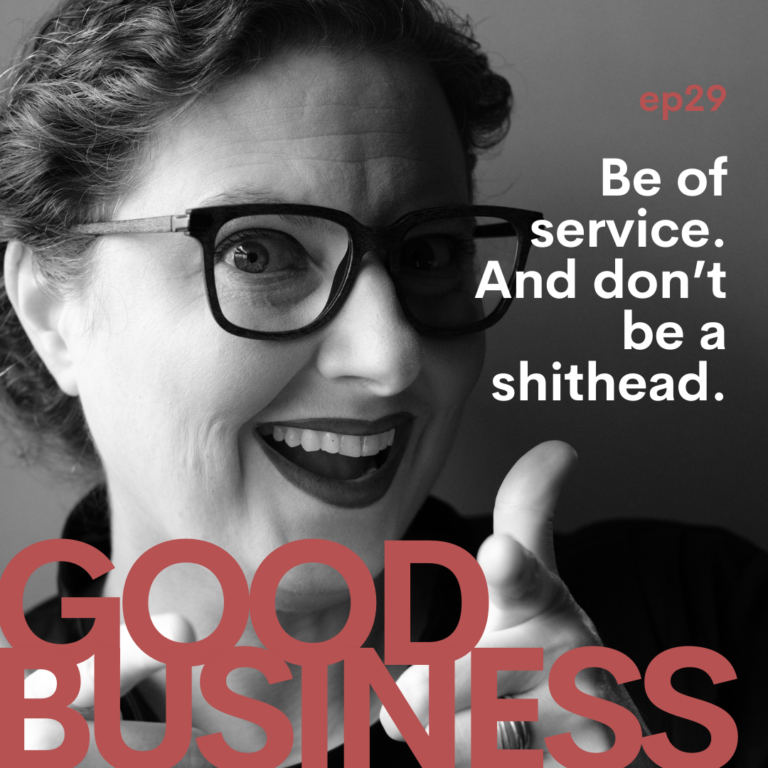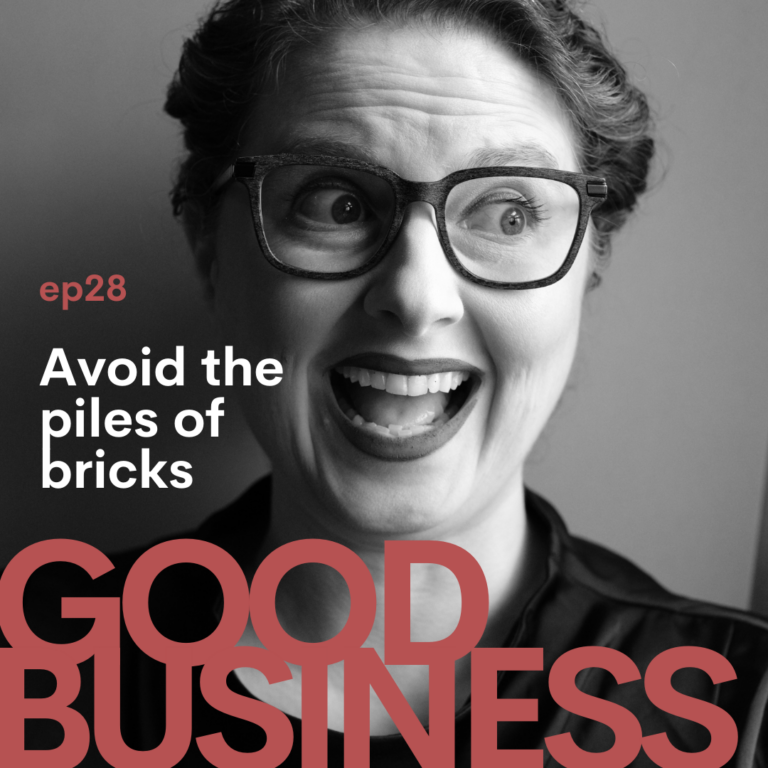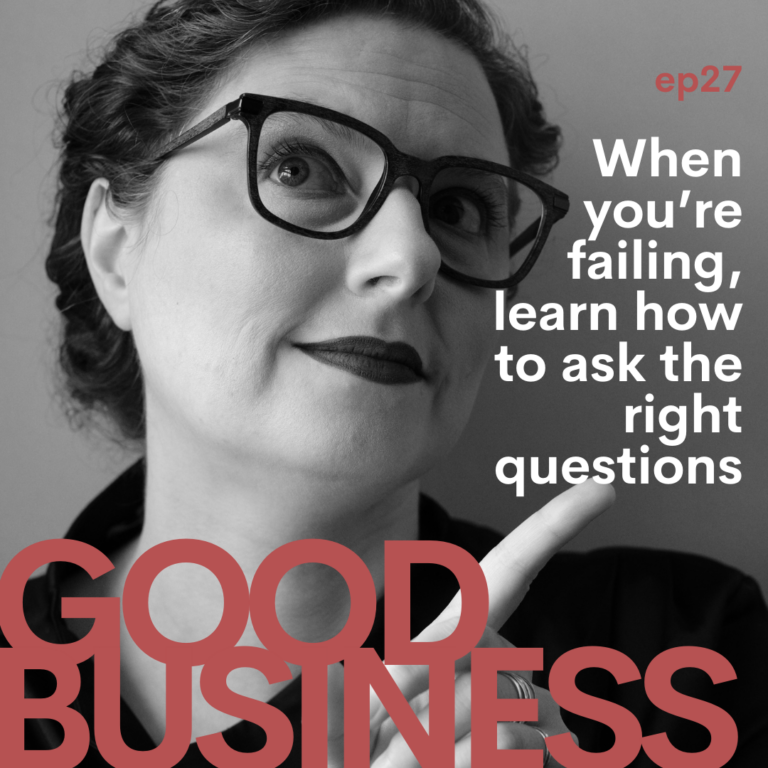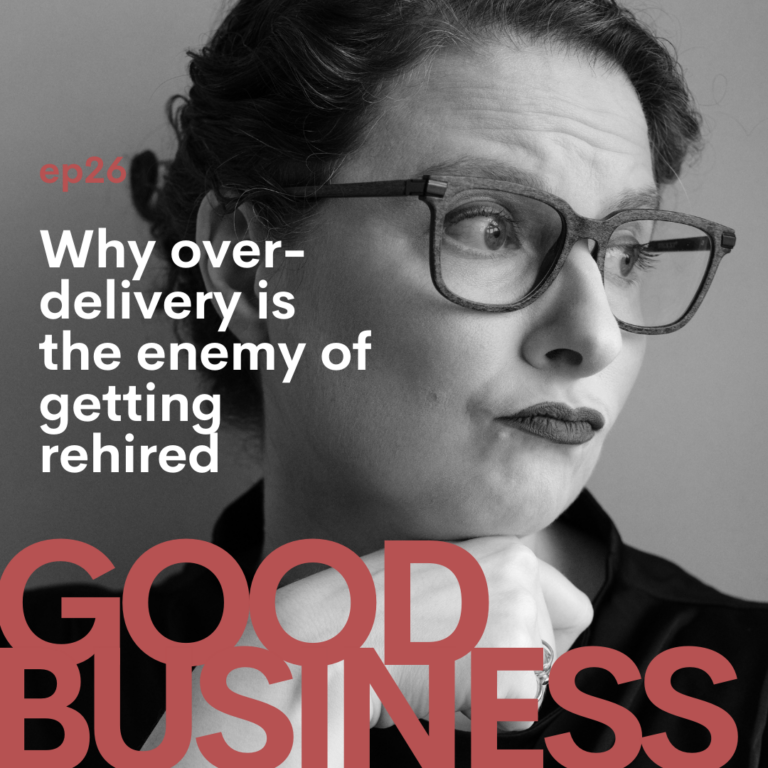Episode 50! Today we take a small break from our series on offer design and talk about, well, what I do and why I do it. In this episode, I talk about how I got where I am today, the big why, the triple bottom line, the kind of clients I work with, teaching leadership, and more.
Thanks for listening. I am truly grateful that you’re here.
Episode Transcript:
Welcome back to The Good Business Podcast. Today is an extra special episode because it is our 50th episode. And to mark that very auspicious occasion, I want to do a special episode all about yours truly. That felt sort of appropriate somehow to mark the fact that I actually managed to record 50 episodes of a podcast.
So welcome to it, everybody. Today is all about moi.
I also want to begin by saying, I hope today’s episode sounds a lot better. We have been struggling with sound issues on my end and making sure that we record episodes that sound as good as the content hopefully is, is really, really important. And frankly, we didn’t realize that we were putting out some sound that was a little bit subpar in the last several episodes.
So from now on, hopefully everything sounds much better to you. It definitely sounds better to me.
All right. Without further ado, I would like to jump right in. Today, I’m going to talk a little bit about what I do, why I do it and why I continue to do it after almost 15 years of this. So I hope you guys won’t mind indulging me for a little while. I get asked these questions a lot, so I’m operating under the assumption that you’re interested in my backstory and my big why.
The first thing I want to say is a little bit about the big why thing. We’ve all heard about the idea of the big why. I’ve covered it kind of extensively here and in other places.
And I generally don’t think that the idea of having one thing is really all that useful. You know, we all have, a combination of things that make us who we are and make us make the choices that we do. But understanding at least what the amalgamation of those choices adds up to at any given time in your life is useful in my opinion, because it allows you to have a basic filter to run your ideas and your goals through.
The big, dangerous part of that is that over your life, those priorities are going to change. And if you’re hanging on to that one big why that you took a seminar on and figured it out all at once, you might miss the fact that you’ve changed or that your business is changing or that the market is changing or that the world is changing.
That has to be something that’s a dynamic process. So I’m gonna kind of tell the story of who I am and what I do and why I do it with that in mind, and with, through that lens of the fact that what I do has relatively stayed fairly similar to what it was when I began, but the reasons I do it, the reasons I continue to do it, the reasons I make the choices that I do about how the delivery system changes and evolves over time, that is definitely dynamic. I hope you guys enjoy.
Now to begin, I’m going to talk to you about my experience. These are not things that I generally put out there all that much. So it seemed like fun to talk about it a little bit.
Before I started my business, I was in the coffee business for a little over a decade. That’s where I spent most of my foundational time in my last job job was as a national sales manager for a teeny tiny organic coffee company. It sounds far more impressive than it actually was. It was just a few of us working in an office and trying to make magical things happen in approximately 2005. Something like that.
So I flew all over the country, selling organic coffee and selling people in the south specifically. I worked in Texas a lot. And I spent a lot of time talking to old guys in Halliburton hats about why organic is actually a good thing and how the food of their childhood probably was organic. They just didn’t know it because they didn’t dump pesticides on everything. So that got me really excited about environmentalism and about sustainability. And it was, the mid aughts when green was all the rage and that was the biggest societal problem everybody was super hyped up about. So I did what I thought was the best possible option, right then, which was go back to grad school and get an MBA in sustainable enterprise, which was an incredible education.
And I… it was the first really of its kind. There was a couple of green MBA programs at the time, but it was really the most fleshed out, or most full featured. And the idea of sustainability was something people were still trying to wrap their heads around. So it was pretty cutting edge. And I learned the foundations of what it means to create any kind of entity that can sustain itself. My education had a background in really foundational black and white basic business education. We did all the finance stuff and the managerial stuff and the reading spreadsheet stuff, which I definitely did not excel at. The color coding part, totally on it.
The, all the math, not so much. Barely made it through on that part. Still struggle. Had to promise my finance teacher, in fact, that I would hire an accountant, first thing, when I started a business. And I kept that promise. I also though learned about all kinds of really interesting sustainability initiatives and frameworks. Concepts like back casting and cradle to cradle, and, how to think critically about problem solving, which was the really biggest, that was the biggest takeaway from my education was learning about how to critically problem solve for change in leadership.
That’s the stuff that I carry forward with me and still deploy every single day. Now, all of the other pieces, the marketing pieces, the, the managerial, financial stuff, all absolutely factors into what I do. But, that piece, the critical thinking part, that was the most critical and the most valuable for sure.
Once I went through grad school, I came out the other end and had all kinds of big ideas about starting companies and starting businesses. And what I saw again and again and again, was that even though I was working in the sustainability space, everyone was trying to wedge it into traditional business.
The backbone of sustainable business concepts is a idea called the triple bottom line, which is people, planet, profit. Instead of just paying attention to one bottom line, which is your financials, sustainability talks about people, planet, profit. How do you consider the human beings that will be effected by your work? How do you consider the environmental implications of your work? And how do you consider the financial obligations of owning a business? How do you consider them equally instead of in these sort of siloed initiative things that it all comes down to the financial bottom line?
If you can actually incorporate those things as being just a way of functioning, it can be extremely successful. But when you try to tack on the people and the planet part onto a fiscal based business, that’s where things get really sticky. And it doesn’t always work.
As I started getting into the business world more and more, what I saw was this kind of stuck together version. And what you end up with a stuck together version of people, planet profit is you end up paying really close attention to money and not so much the people and the planet part. And that’s a venture capitalist want. Everybody wants to make money.
And when it comes down to it in the current climate and business back then, and really still now, that’s obviously still the most prevalent message that you get. And what I saw was if I was going to create some sort of big startup-y business, I mean, I lived in San Francisco at the time, so I was looking to kind of create that big Opus type startup –was that I was going to lose control of the ability to actually pay attention to those things in a meaningful way.
And what interested me more than that was to stay small and to think about how I can affect change, in the most impactful possible way. So over time that evolved from working in a very small business and seeing what was possible with a really small team, which was really cool and an amazing business education and in real life.
But when I struck out on my own, I aspired to create better leaders. I don’t think I really had the language for it at the time, because the thing that lit me up the most was helping people make their dreams happen. And that’s been something I’ve repeated again and again. It’s been kind of my big, why. Is
I really like helping people make their own stuff happen. But the subtext underneath that was that I want to help them make their own stuff happen in a way that incorporates these three ideals all the time, but without hammering people on that language. That was sort of the secret sauce underneath.
How do you consider all those things simultaneously right from the jump? Because if you do it right from the jump, then there’s nothing to reinvent. There’s nothing to reimagine. There’s nothing to think about because it’s just how you function as a business leader. So that kind of became the foundations of a business coaching practice at a time when I was mostly running a creative design agency.
My business started as Makeness. It was born out of the idea of make a business. And I was very clever. I thought that was the best name ever. It turns out it’s really hard to say at cocktail parties. You say my design agency called Makeness and people go, oh, what now? And what is it called? But as a domain, it looked really great.
So I ran as Makeness for a long time and people come to me for a website and I would say, well, what does your business stand for? And they’d go, uh, and I would say, well, what do you want your brand to look like? They’d go Uh, so we would do all this consulting. And what I found was the consulting part was far more fulfilling. Because problem solving is my happy place.
Oh my goodness. You give me a juicy problem and I am in heaven and I found that that part of the process was the thing that lit me up far more than the design end did. I leaned heavy in that. And frankly, I was better at that than I was at the design. I’m a solid designer, but not world-class by any means.
We all got to know what we’re capable of. And what I found was that I was really good at helping people develop a concept, develop an idea around their ideas so that they could create something that was both sellable and felt really, really good, which anybody who’s listened to this show before knows that that’s pretty much my stock and trade.
Over the last 15 years that has evolved away from design. I no longer have a design agency. That shuttered about five, four years ago, something like that now. And now I only teach and coach and strategize for clients. And now I am some version of a hybrid between strategists, startup consultant, business coach, best friend, temporary business partner, and did I say creative director? That’s probably in there too. And I work with clients as kind of like a general surgeon of whatever they need. I work with clients at a couple of different levels. The first are the brand new people, the ones who are just they have the whiff of an idea and not much else. But they know that they can’t do it the way other people are doing it.
They know that they need somebody to guide them into doing business in a way that doesn’t feel like shit. And I’m really good at that. And I love working with brand new people and I still love working with brand new people. And I hope that I always do. And it’s something that I aspire to do as much as I humanly can which is part of why I’m developing some new things that will be coming next year, to make more and more accessible to more and more people because it is my wholehearted belief.
And this is the, this is the money shot, you guys. It is my whole hearted belief that if we can make better leaders right from the start who don’t have to unlearn all the bad habits, then commerce will change. The way in which commerce functions as an us versus them wealth building entity will change.
My business is proof that that’s possible. When you treat people with respect and you don’t pre penalize them for not having enough money or, and you don’t shame them for not being able to afford to invest in themselves at the level that you think they should.
When you actually empower people to do their best work, they do. And they show deep gratitude and appreciation and compensate you absolutely fairly.
So if I can teach that more to as many people as possible, that’s my biggest work in the world and is absolutely the thing that gets me up every day. So over time, it has moved away from, I like making people’s dreams happen, that part’s still fun, but that’s not the thing that lights me up.
The thing that lights me up is the possibility that comes with making people’s dreams get off the ground ethically, responsibly, and with a triple bottom line concept in mind.
I want to raise up leaders who don’t know another way to do it, who aren’t just following the people in front of them off a cliff or into financial wealth, without any regard for who they can help or who they harm in the process. Because people have a lot more power than they realize. You have a lot more power than you realize.
And I want to make sure that people know that.
So that’s the work that I do with new business owners.
I also I’d say about 30% of my business is working with established visionary types. People who have hit a level of pretty significant success, and who still feel like all the moving parts don’t fit together. Or they might be the people who followed all of the advice into the dark places of shame-based selling or high pressure selling or, all the heavy duty sales crap that we’ve all seen, that I don’t have to go into great detail about.
And they don’t like it. It hasn’t made them feel good. They have high rescission rates. They have a disconnected team. They feel like they’re just grinding away at something and they don’t know what to do about it because they love their work, but their businesses become an animal that they barely recognize or don’t enjoy anymore.
That’s my other sweet spot. How do we help take that apart and turn what power and equity they’ve built into something that can both reach more people, and thrive for them as personal human beings. So they don’t have to feel like they’re at a grind all the time.
So I work with a few best-selling writers. I work with some incredible artists. I work with some brand new little baby newbie businesses that are just starting out and not a whole lot in the in-between place. It’s like those who have established themselves or those who are just starting out. Those are the spots that I work.
I always aspire with both groups to become obsolete.
All I want for my clients is to get to a place where they no longer need to run ideas past me, where they’ve learned the critical thinking skills. And they’ve learned how to evaluate problems, ideas, and opportunities in front of them in a way that helps them make decisions from the heart and the head all at the same time.
Now, some of my clients work with me for a course of nine months to begin, and then they’re done and they feel like they got what they needed. They’ve developed those skills and they’re ready to fly out of the nest on their own. Other clients work with me for years at a time. I have clients that I’ve worked with for 5, 6, 7 years. And then sometimes they just come back for a tune-up after a few years. I have other clients that do intensives with me. That’s a couple of days and we dive in head first and that’s all they need from me.
I’m a really flexible coach. I try to work with people in the way in which they best function.
And I also work with people to make things as affordable as I possibly can. Now this is not a sales pitch. This is just an overview of my work and my business, because I don’t talk about it all that much. I have worked with a pay it forward fund, I think I did an episode on this awhile back, for quite a long time.
So the clients who can afford more, pay more, the clients who can’t don’t. And one supports the other transparently. And you’d be amazed when you ask somebody who makes a lot of money if they’d be willing to pay an extra 50 or a hundred or $200 a month for their coaching to support the work of someone coming up behind them, you’d be shocked at how many people say yes.
And you’d also be shocked to know that the people who benefit from those pay it forward scholarships who are on their way up, how many of them send me money for years afterwards to pay it back or pay it forward as the case may be. I, in fact, I get, I got a check last week from somebody, I worked with so long ago, they benefited from scholarships so long ago that I didn’t even recognize their name.
And they sent me $500 in the mail to pay it forward to the next generation of business owners. Because they had hit the success that they, that I set them in motion for.
So the work that I do is proof that the work that I do works. How I function, how I work in my own business. I have a balanced schedule. I make great money. I get to do things on my own terms and my clients are over the moon happy. And I’m also flexible and human all the time. And everybody wins. It is actually possible to make everybody win. But it’s hard work to fine tune that over time. And I’ve put in the time and I’ve put in the work. And I help my clients do the same.
So that is my professional story. And maybe one day I’ll do a personal one, but today I think that’s about enough. So thank you all for joining me today and always, and for joining me for the past 49 episodes. And I hope you’ll join me for the next 50. I hope you guys had a really nice day today and I hope wherever you are, it’s springtime and it’s beautiful and you can enjoy a little bit of fresh air.
Have a great day, everyone. Bye-bye.
More Episodes
Why you shouldn’t start a membership site | GB31
Today's episode is all about how to look a little closer at the ever-growing trend of membership sites all over the place and how to know if you should jump on the bandwagon or not. Episode Transcript: I'm Illana Burk, CEO of...
Four not shocking disappointments in a time of crisis | GB30
Today’s episode is about the simple idea that your business exists not just to support you and your stakeholders, but to support your community.
Be of service and don’t be a sh*thead | GB29
Today's episode is all about how to not be a jerk in the middle of a crisis. Episode Transcript: I'm Illana Burk, CEO of Your Life's Workshop, coach to entrepreneurs and solopreneurs across dozens of industries and host of Good...
Avoid the piles of bricks | GB28
Today, we talk all about that craptastic feeling of being buried. Underwater. Crushed by the weight of big ideas, neverending task lists, and elephant-sized goals. First, we’ll talk about what this really means and the ways in which this feeling tends to show up, along with a little on how we tend to behave as a result. Then we’ll talk about a simple way to handle these moments better. And finally, we’ll wrap up with a healthy pep talk.
When you’re failing, learn how to ask the right questions | GB27
Today’s episode is all about how to not shoot yourself in the foot right out the gate. I’m gonna break down one very common mistake that newbies (and non-newbies) make and how to fix it. Today, we learn how to ask for help and guidance in a way that doesn’t completely fuck up your chances of getting what you ACTUALLY need, which is respect.
Why overdelivery is the enemy of getting rehired | GB26
Today’s episode is all about why over-delivering is a really good way to not get asked back for more work. We all think doing our best and giving more than people asked for is a good thing. And in some ways, it is. Things like adding extra value to something you do is fine. What I’m talking about is when you completely blow the scope of what was asked of you out of the water. It’s one of the hardest things to identify when you’re trying to figure out why no one seems to hire you twice.

